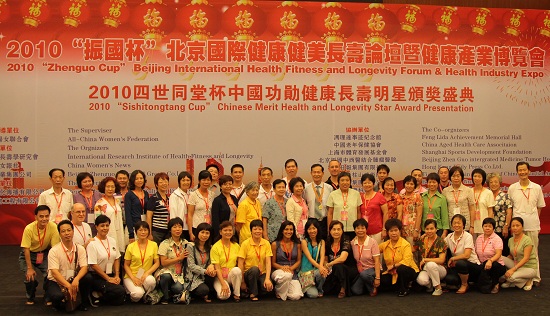A Fascinating Trip to China with Master Ou — By George Iber, September 2010
At the moment, I feel like I am having a reentry experience onto the surface after a few orbits around the planet. What a fascinating new perspective one gets about culture and spiritual insight after traveling to China with Master Ou. The tour had everything we needed, a fantastic conference in Beijing, excellent meals, fine wine, historical tours, modern and ancient vistas, Master Ou’s hometown village, but most importantly, the kind and generous hearts of all who attended and made the trip possible.
September 2nd and 3rd
The 2010 “Zhenguo Cup” Beijing International Health and Longevity Forum and Health Industry Expo. Master Ou was one of the vice Chairman of the conference.
After we arrived at the enormous and ultra-modern Beijing International airport, the five international travelers were picked up and taken to terminal 2 where the bus was filled with national travelers. I had been wondering why such a big bus had picked up just the five of us, but this is China, and nothing here seems to be done on a small scale. We were all taken to the conference hotel, where we checked in and prepared for the first of many excellent dinners with Master Ou, his family, and all the other students. What a reunion, we were excited to be in China, and all the students were eager to have some time with Master Ou. Energy was high, toasts of friendship everywhere. We are fortunate to be able to see Master Ou in the United States so easily. As a non-Chinese speaker, some of the conference proceeding was lost to me, but there was varied English translation available. The conference was attended by over 1000 individuals from many different countries, although most were Asian-Pacific, and included Australia, Japan, Indonesia, and of course China. We five travelers from North America could be said to represent Canada, Mexico and the United States.
The collection of Thesis is a bilingual summary of the contents of the conference. The many titles reflect the full range of possibilities, from the strangely obscure, such as bending a spoon with qi, to thorough research on the benefits of qigong to improve health. It is interesting to read the research, although as a qigong practitioner, I am not surprised by the many positive outcomes. One of the speakers made the point that qi remains non-localizable, and can not be tested directly, only through its side effects. In that case he pointed out, that even if qigong does not cure 100% of certain case, that does not mean it is not effective, only that we have failed to account for the many possible variables that can affect an outcome. Generally speaking, the presentations were either very speculative, or attempted to be scientific research. There was one notable exception, Master Ou’s presentation was scientific, and included some of his successful case studies in the conference, as well as philosophical.
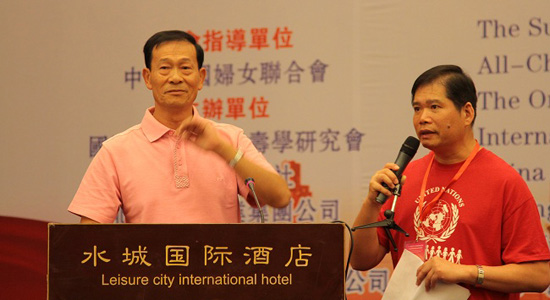
Master Ou (left) was presenting his awarded paper titled “With a harmonious heart and kind qi, a long and healthy life will be attained.” Vincent Chu (right) was translating.
Master Ou’s presentation was titled He was the only speaker to address the issue of the heart (and the only speaker to sing). This is extremely important, for there is a tendency to think of qigong as merely a set of exercises that produce benefits somehow through movement. I hear that all the time in the west. The central principle is stated in his essay, “Of course, the “heart” I describe here is not the actual physical organ inside a flesh and blood body; however, it is indeed a commanding mechanism that does literally exist inside the human body. In terms of modern common understanding and usage, this “heart” refers to intelligence, thoughts, emotions, attitudes, etc.” Secondly the “kind qi” refers to the positive energy of the sun and moon, that can be absorbed with proper qigong exercises. For a long and healthy life, Master Ou advocates absorbing the kind qi and cultivating a harmonious heart. It is easy to gloss over the aspect of the harmonious heart. Among Master Ou’s many students, it is obvious that they make great efforts to cultivate the kind heart and absorb the qi from the sun and moon. Master Ou’s essay earned the award of the best papers. He also won another two awards: the highest honor medal and the outstanding contribution award.
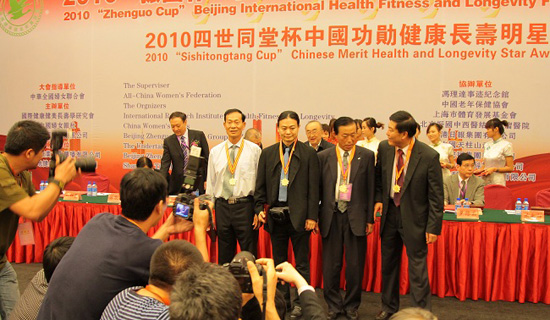
Master Ou’s essay earned the award of the best papers. He also won another two awards: the highest honor medal and the outstanding contribution award.
I listened to many stories of amazing healings resulting through Pangu Shengong practice, but one is sincerely moved by the quality of sincerity and kindness of the person telling the story. It is a though you are listing to individuals who have a special connection with kindness and compassion. Indeed I have heard Master Ou speak on the requirement of cultivation the heart to grain the best benefits form Pangu Shengong. These individuals place before all other things the value of cultivating a kind heart and soul. Whenever possible, Master Ou has his students singing, and now chanting, his music therapy to cultivate the heart-soul. He seems intent on cultivating celestial singers.
Later in the conference awards were given out to “long lived” individuals.
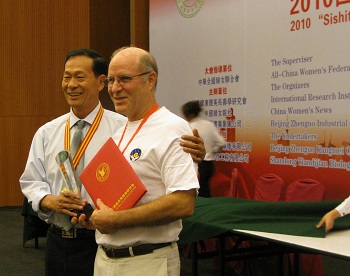
George Iber (right) earned an award in honor of his outstanding participation and contribution to the field of health and longevity together with Paul Fraser, Vincent Chu, and Olivia Ou
Ok, I am not 90 plus years old, nor do I begrudge not getting an award, but for sixty, I feel remarkable. Since I am almost sixty now, I realize that some of the awards went to individuals who were really not that much older than me. (George Iber earned an award in honor of his outstanding participation and contribution to the field of health and longevity together with Paul Fraser, Vincent Chu, and Olivia Ou.) Certainly time and change will not stop for anyone, but if every day we can absorb the kind qi and cultivate more kindness of heart, I am confident that many of us will receive a longevity award. But here is something to contemplate. While we say that this is an easy qigong to practice, with simple movements, we must remember that the real “gong” is difficult. It is great that we have immediate health benefits, but the aspect of tempering, may be the biggest challenge we can face in life. If we concede that real health is dependent upon purity of heart, then the witnessing aspect of our soul, which we might ascribe the value of our consciousness, knows very well what thoughts we cultivate. The next day we went “site-seeing.”




 Mr. Xue
Mr. Xue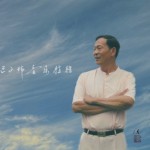
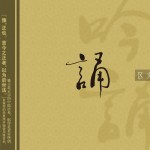
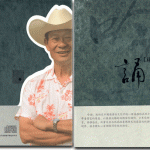


 Paul Fraser
Paul Fraser